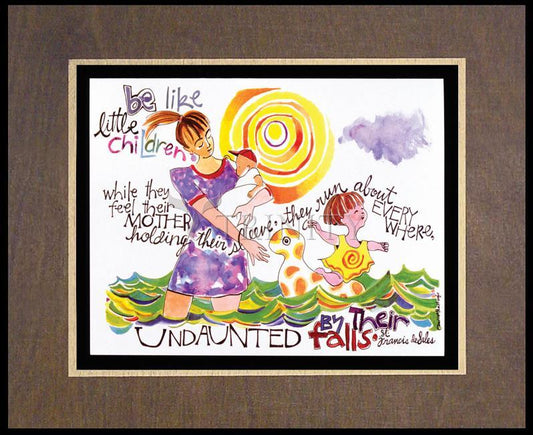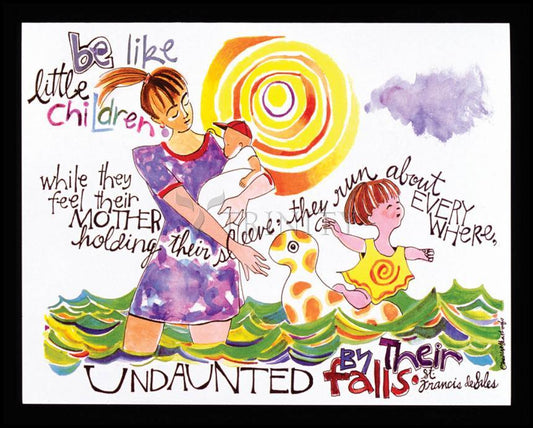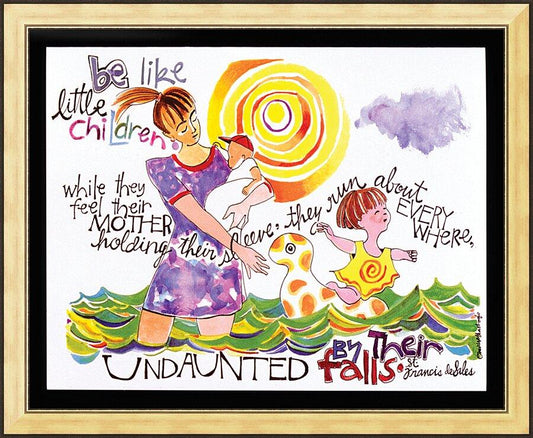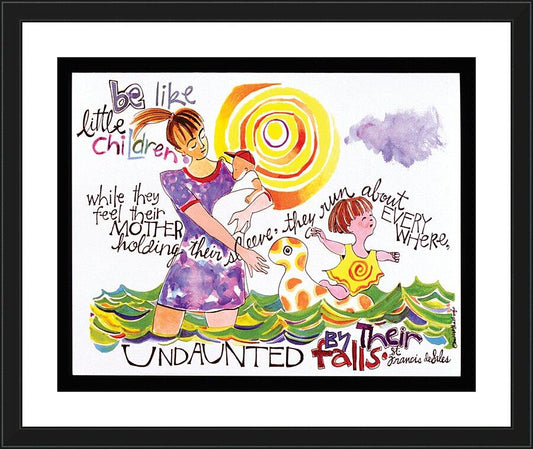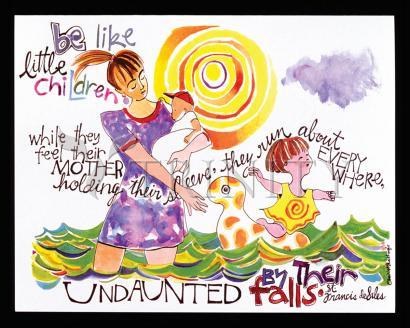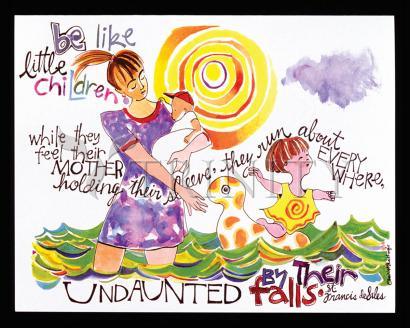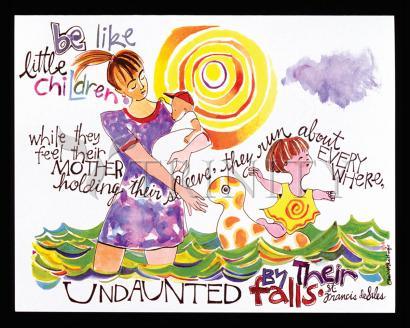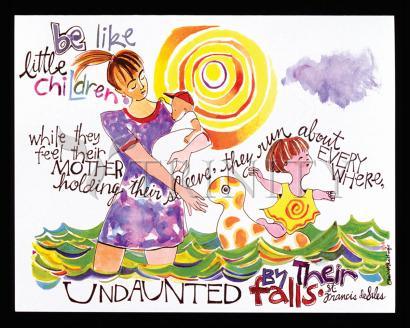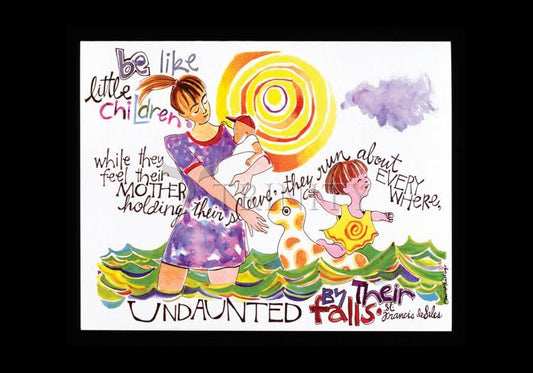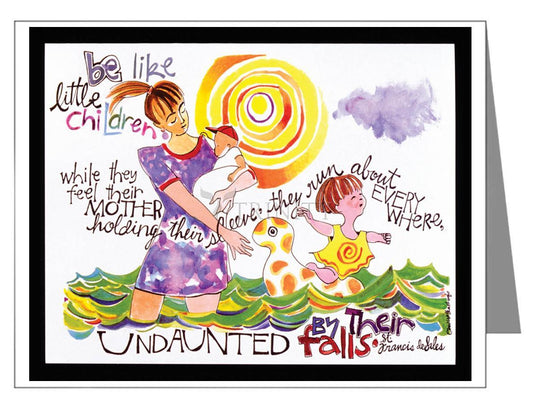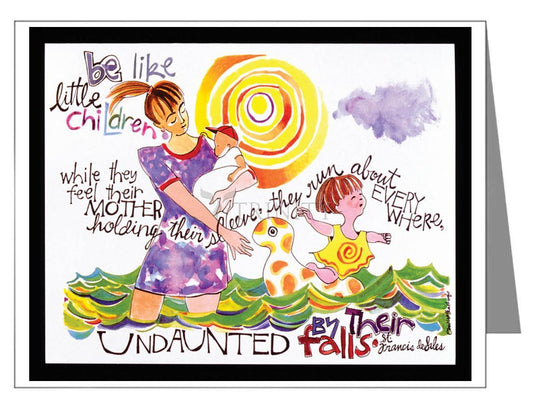Jesus taught that both 'receiving' a little child and being like a little child requires a whole new view of God's kingdom and a whole new plan of action -- God's plan.
The Gospel of Mark was the earliest of the canonical gospels. Due to the author's unfamiliarity with Palestinian geography and his lack of knowledge about Jewish customs, he almost certainly was not from Palestine, and it is unlikely that he was a Jew. So he most likely had a Gentile perspective and was writing for a primarily Gentile audience, traditionally believed to be in Rome. He wrote:
Mar 10: 13 And they were bringing children to him that he might touch them, and the disciples rebuked them. 14 But when Jesus saw it, he was indignant and said to them, "Let the children come to me; do not hinder them, for to such belongs the kingdom of God. 15 Truly, I say to you, whoever does not receive the kingdom of God like a child shall not enter it." 16 And he took them in his arms and blessed them, laying his hands on them.
Mar 9: 33 And they came to Capernaum. And when Jesus was in the house he asked them, "What were you discussing on the way?" 34 But they kept silent, for on the way they had argued with one another about who was the greatest. 35 And he sat down and called the twelve. And he said to them, "If anyone would be first, he must be last of all and servant of all." 36 And he took a child and put him in the midst of them, and taking him in his arms, he said to them, 37 "Whoever receives one such child in my name receives me, and whoever receives me, receives not me but him who sent me."
The author of Matthew was most likely a Jew who may have lived and wrote in Antioch, Syria, and most likely was writing to a mixed but primarily Jewish audience. The author of Luke traditionally is believed to have been a Gentile converted to Christianity. He may have been from Antioch, Syria, but writing from Achaia, Rome, or Bithynia. If he personally spent time with Paul, it most likely was before Paul began traveling and writing letters. Luke's author seems to have been writing primarily for an audience of Gentile converts. Both Matthew and Luke used Mark as a resource for their gospels. They wrote:
Mat 18: 1 At that time the disciples came to Jesus, saying, "Who is the greatest in the kingdom of heaven?" 2 And calling to him a child, he put him in the midst of them 3 and said, "Truly, I say to you, unless you turn and become like children, you will never enter the kingdom of heaven. 4 Whoever humbles himself like this child is the greatest in the kingdom of heaven. 5 "Whoever receives one such child in my name receives me, 6 but whoever causes one of these little ones who believe in me to sin, it would be better for him to have a great millstone fastened around his neck and to be drowned in the depth of the sea.
Luk 9: 46 An argument arose among them as to which of them was the greatest. 47 But Jesus, knowing the reasoning of their hearts, took a child and put him by his side 48 and said to them, "Whoever receives this child in my name receives me, and whoever receives me receives him who sent me. For he who is least among you all is the one who is great."
The traditional Jewish perspective on children and Jesus' new teaching on greatness are described below by Joanna Dewey (Searching the Scriptures: A Feminist Commentary, edited by Elizabeth Schussler Fiorenza, NY: Crossroad, 1994, page 490) in her commentary on Mar 9:30-37.
Mark presents another paradox: the way to true power in God's realm is the opposite of what the world recognizes as power. God's realm is a place of service, diakonia. This is ordinary service -- waiting on table, taking care of children. Although in wealthy households male or female slaves did these tasks, in the peasant world of Jesus and of Mark, wives and daughters did these tasks. The twelve men are called to do women's work.
The Markan Jesus immediately gives an example: he places a child in the midst of the Twelve and instructs them that to receive a child in his name is to receive Jesus and the God who sent Jesus. In ancient society the child was not a symbol of innocence or purity of heart. At the bottom of the hierarchical structure, the child was most easily and perhaps most often exploited. By making the child the symbol of the one to whom service is rendered, the narrative makes explicit that service is to be given to those with less power in society, not those with more. Furthermore, by being the servant of all, one receives God. Service is not presented as a way to be rewarded later by God. It is a description of how God's realm works: service is where we meet God now.
The largely Gentile (Greek or Roman) audiences of Mark and Luke typically would have an even more vulnerable perspective regarding children than would the mainly Jewish audience of Matthew. This dismal perspective regarding children is described by Everett Ferguson (Backgrounds of Early Christianity, Second Edition, Grand Rapids, MI, Eerdmans, 1993, pages 73-74) in his section on the practice of "exposure" of children, which was the practice of abandoning unwanted children to die or to be found and raised as slaves.
Exposure of Children. The Hellenstic world lived under the shadow of too many mouths to feed. W.E. Tarn has presented evidence that from 230 B.C. onward the one-child family was commonest in Greece. Families of four or five children were very rare. There was a certain desire for two sons, in case one should die or be killed, but seldom did families raise more than one daughter. A daughter was an economic liability, because a dowry had to be supplied at her marriage. The first child of a marriage, if healthy, was almost never abandoned.
The answer to overpopulation was infanticide. Abortions were often attempted, but not infrequently were fatal to the mother; they were made illegal under Septimius Severus. More frequent was the exposure of the newborn child. The unwanted child was simply left to die on the trash heap or in some isolated place. Sometimes slave traders would take the child to be reared in slavery. Girl babies might be taken to be reared for a life of prostitution. Infanticide was not viewed in the same moral light by Greeks and Romans as it was by Jews and Christians... The newborn was not considered a part of the family until acknowledged by the father as his child and received into the family in a religious ceremony. Thus, they did not consider exposure murder but the refusal to admit to society. Jewish law, on the other hand, prohibited abortion and exposure, a position adopted also by Christians. Otherwise no moral voice was raised against infanticide until Musonius Rufus and Epictetus. In the second century the city of Thebes made the practice illegal, perhaps the only people except the Jews to do so until Christianity intervened.
Jesus shed a whole new light -- the light of the Gospel, the Good News -- on children, women, and all who had been marginalized by Jewish and Gentile norms -- whether based on age, gender, economic, social, religious, national, or other considerations. The disciples of Jesus then and now are to serve the marginalized, just as they professed to serve Jesus. Yet Jesus went even further. His parables turned upside down the sensibilities and common view of the world. So did his teachings about children. The kingdom of God is real, a reality that includes all humanity and excludes no one -- the kingdom of God that is "within" each one. (See Luk 17:20-21.) In fact, Jesus' disciples were not only to "receive" little children, they were to be, like little children, the children of God. It is significant that Paul and the writer of 1 John refer to fellow Christians as "little children."
"Excerpts from Jesus and Little Children by Robert Nguyen Cramer



